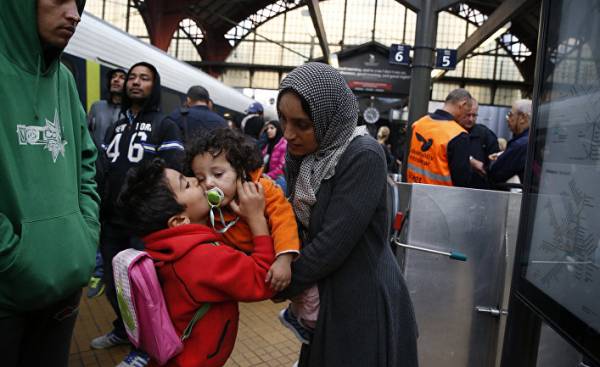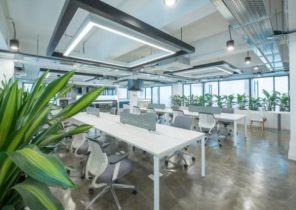
Every fifth newborn’s mother is a foreigner. The first expert believes that it is good for enhancing fertility. The second expert believes that the succession in Denmark is in danger.
The flow of refugees from Syria to Denmark — the main reason that Syrian women are now the second largest group of newly made mothers in the country. After the Danes.
The Danish statistical Agency: 1 181 mothers were of Syrian origin.
In General, the statistics indicate that more than every fifth baby born in the Danish hospitals in the past year, born to mothers who either themselves immigrants or are descendants of immigrants.
In third place are the mother of Turkish origin, they had 1 132 infants. In the next place polka — 762 baby.
Ten years ago, approximately one in eight child to have a mother — an immigrant or descendant of immigrants. The number of young new citizens who have mothers with a foreign background increased from 13% to 21%.
It is possible to Express the same thing using rough numbers: about 48 thousand newborns last year were born to mothers Danes, while more than 13 thousand mothers were of foreign origin.
From them 4 thousand babies were born to mothers from Western countries, and 9 300 — mothers with roots from Western countries.
Denmark becomes darker
Professor of social anthropology Lund University Steven Sampson (Steven Sampson) — he is by birth an American, married to a Norwegian, lives in Denmark and works in Sweden, two of his grandchildren have four different passports, said in an interview with Politiken that the statistics in connection with immigration and the number of offspring of immigrants is perfectly legitimate.
The same applies to their children.
“It says something about that Denmark becomes “darker”. The same thing happens in the US” — so it refers to Stephen Sampson.
But the numbers absolutely nothing to say about where Denmark is, says Professor who has been researching issues of immigration and clash of cultures.
Descendants cause fear
“Descendants of immigrants and their children are afraid, but the number itself says nothing. We need to look at their quality. For example, my children — descendants, and let me say that they and their children contribute to the development of society,” says Stephen Sampson.
From a technical point of view, under the descendants refers to people born in Denmark to parents neither of whom is a citizen of Denmark and not born in Denmark.
“Can you look at US, and then we will see how the descendants of Germans and Iraqis originating from a completely different environment, integrated. 20-30-40 years later can be very difficult to determine where they are. They become Americans”.
Steven Sampson indicates that “we’ve never been able to dream about, to talk about the descendants of homosexuals.”
This is good for enhancing fertility
In his opinion, first of all, it is a promising factor that the low birth rate in Denmark receives assistance from the outside, thanks to immigrant women or the descendants of immigrants.
“There will be more kids to pay our pensions. It’s just wonderful. But then we must look to their quality. If they live in a parallel society without any contact with the Danish society, then it’s bad. It’s just as bad, when the children of Danish parents become lazy or drug addicts. In all these cases, we need to look at why this happened, why in our society they did not have enough resources to become normal people”.
Professor at Lund University, and he, as he admits, is concerned about the fact that more and more people clearly have no idea who they were, Nikolai Frederik Severin, in Relation to (1783-1872, Danish priest, writer and philosopher, an important figure in the history of Denmark — approx. ed.) or Johannes Vilhelm Jensen (1873-1950, Danish writer, Nobel prize for literature — approx. ed.)”.
“But this also applies to a growing number of Danish children who have no idea about it. And my own children have traveled the world but never been to Western Jutland. But they have the knowledge and skills which I have none.”
Those who work
Stephen Sampson is — among others — and friends-Romanians. Romanian women in the past year was the fifth highest birth rate in Denmark.
He says that those who “drives a truck, works in Parking lots, cleans and is specialists for care.”
“They are working round the clock, but live in areas where there are not so many Danes, it is possible that they will become a burden to society because they retire early and need help in many areas, because they do not fully understand our society. And we need to help them.”
The continuity is in danger
Historian and honorary associate Professor Henrik Jensen (Henrik Jensen) said in an interview with Kristeligt Dagblad, which published new data on the birth rate, which, although previously also saw an increase in the proportion of population of foreign origin, the increase in the number of newborns with foreign roots confronts society with new challenges.
“This puts pressure on the efforts in the field of integration, if you wish to save to the country a certain continuity,” he believes.
“If you will have a tendency to the existence of parallel society where the group is isolated, it will have a negative skazhetsya on social cohesion, — in this there is no doubt,” says Henrik Jensen.
But the development can go in a positive direction, he adds.
“If the integration is really successful, it is an advantage that children are born because children in our country were born is not enough” — said Henrik Jensen.
Hans Hansen (Hans Oluf Hansen), honorary associate Professor Copenhagen University, a specialist in demographics, in an interview with Kristeligt Dagblad said that he was not surprised that the number of children born to mothers of foreign origin is growing.
However, he did not believe that the situation will inevitably develop in this direction, because fertility often varies depending on how long a particular group of the population is in the country.







